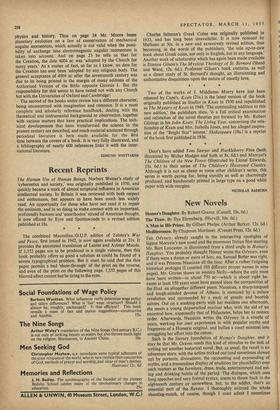New Novels
Homer's Daughter. By Robert Graves. (Cassell, 10s. 6d.) The Thaw. By Ilya Ehrenburg. (Harvill, 10s. 6d.) A Man in His Prime. By Gilbert Phelps. (Arthur Barker, 12s. 6d.) Medlterraneo. By Chapman Mortimer. (Cresset Press, 12s. 6d.) THE Odyssey, already caught in the intersecting spotlights of Signor Moravia's new novel and the enormous Italian film starring Mr. Burt Lancaster. is illuminated from a third angle in Homer's Daughter. You probably thought Homer wrote the Odyssey, even if there were a dozen or more of him; no, Samuel Butler was right, and it was Princess Nausicaa all the time. After a rather fatiguing historical prologue (I counted 103 different proper names in nine pages), Mr. Graves shows us western Sicily—where the epic must -have been written—in about 750 ac—which is about right be- cause at least 150 years must have passed since the composition of the Iliad. an altogether different poem. Nausicaa, a sharp-tongued and tough-minded devotee of Athene, is menaced by a palace revolution and surrounded by a pack of greedy and boorish suitors. Out on a washing-party with her maidens one afternoon, she meets a young shipwrecked mariner who, with the aid of an ancestral bow, supposedly that of Philoctetes, helps her to restore order. Afterwards, Nausicaa writes the Odyssey in a couple of years, working her own experiences in with popular myths and fragments of a Homeric original, and bullies a court minstrel into smuggling her effort into the canon.
Such is the literary foundation of Homer's Daughter, and it may be that Mr. Graves needs this kind of stimulus to the task of writing yet another historical novel. But, as usual, the result is an adventure story, with the action tricked out (and sometimes slowed up) by portents, divinations. the recounting and expounding of myths, and a tremendous display of erudition (or plausibility) over such matters as the furniture, dress, trade, entertainment and eat- ing and drinking habits of the period. The dialogue, which uses long speeches and very formal syntax, seems to throw back to the eighteenth century or somewhere, but, to the addict, that's an essential part of the flavour. I thoroughly enjoyed the whole shooting-match, of course, though I must admit I sometimes
caught myself wondering whether I really should. Why is there so much physical cruelty? And why isn't there the usual list of characters opposite page 1? And—a question I have often wanted to ask—does Mr. Graves actually believe in things like Nausicaa's authorship of the Odyssey, and his own solution of the riddle in Revelations, and all that about the White Goddess? Well, they make good stories anyway.
People with some experience of the Soviet novel, together with those who know Mr. Ehrenburg primarily for his eloquent war despatches in 1941-45, may be surprised at the amiability and dry- ness of The Thaw: perhaps it was those qualities which affronted some members of the Union of Soviet Writers, rather than its implied criticisms of housing policy, official art and competitive careerism, or its tentative thesis that personal relations provide the warmth which may humanise a society icebound with government decrees. A prime interest of the book to British readers will in- evitably be its account of that society. Mr. Ehrenburg is inform- ative and fascinating on prevailing Soviet attitudes to the organ- isation of industry, to authority, to the October Revolution (still an obsession, apparently), to work in general, but these attitudes are too remote from our own to make the human behaviour which embodies them more than intermittently plausible to us. The same applies, in some measure, to his demonstration of how writers and painters work and are regarded, although artistic chicanery and opportunism seem to show a curious knack of transcending political frontiers.
The plot of the book is nothing very substantial and is rather encumbered with side-issues, but by taking half a dozen love al-lairs between people of differing ages and social strata Mr. Ehrenburg has got together enough material for his muffled-up satire on the conception of love as something un-, and even anti-, Bolshevik, and can give some hint of the various other distractions—worries about the quota, the dreaded summons to Moscow, the intermin- able committees—which help to keep his lovers4apart. The chief literary value here, however, lies in several amusing and firmly- drawn character-sketches, in particular that of an affable charlatan of the brush who selects his portrait-sitters on a computation of their probable political future, and that of a bull-necked factory director, obstinate, immersed in his job, distrustful of his col- leagues, and yet blandly cynical in the face of 'Bolshevik criticism.' These two chaps, plus a number of buried jokes, make me wish I could ask Mr. Ehrenburg to let his humour rip some time, though he would hardly wish to heed a bourgeois reviewer. Or would he?
I had been watching for Mr. Gilbert Phelps's name ever since the appearance of that remarkable first novel, The Dry Stone. In its successor, he has further developed his very rare gifts of de- scription, his ability to catch an exact likeness in how people look, how their expressions change, how they dress, how they move, and A Man in His Prime deserves to be closely read for that alone. On the other hand, the story suffers from lack of pressure—all that really happens is that a middle-aged businessman has a love affair and then returns to his wife, with a fire and a rescue thrown in for good measure—and there is too much self-examination by
the characters, most of it in the form of rhetorical question. The dialogue is sometimes appalling: there is a frightful old-boy type named Hippisley, whose idioms suggest that Mr. Phelps has gone through the dictionary listing the items marked `colloq.' and 'vulg.' When the characters get angry with each other, though, they talk very well. The reviewer, scales in hand, should be able to
weigh up these pros and cons, but I don't think I can, any more than, white-coated at the bench of the semantics laboratory, I can
identify the element which is inhibiting Mr. Phelps's powerful talent. One of its isotopes, perhaps, is his predilection (outside dialogue) for inverted commas, italics, dashes and exclamation marks. But his book should be read.
Mediterraneo is a blown-up short story about a Spanish gipsy and a vendetta. 1 mention it only to record a mild protest against its use of a giant, a mouse, a mermaid, a town and the sea in speak- ing parts, which, together with other novelties, reduce its proceed- ings to irresponsible frivolity. Being original is too easy.











































 Previous page
Previous page